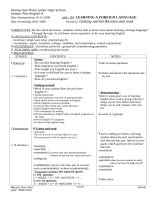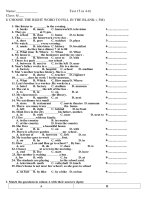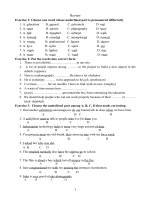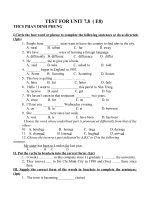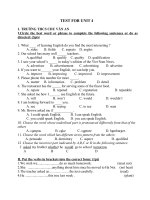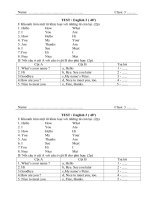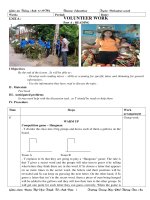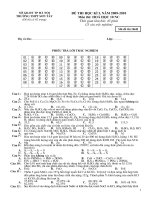BÀI KT UNIT 4- E9
Bạn đang xem bản rút gọn của tài liệu. Xem và tải ngay bản đầy đủ của tài liệu tại đây (211.36 KB, 36 trang )
TEST FOR UNIT 4
1. TRƯỜNG THCS CHU VĂN AN
I.Circle the best word or phrase to complete the following sentences or do as
directed: (3pts)
1. What ____ of learning English do you find the most interesting ?
A. sides B. fields C. aspects D. angles
2. Our school has many well _____ teachers .
A.qualified B. qualify C. quality D. qualification
3. I saw your school’s _____ in today’s edition of the Viet Nam News.
A. advertiser B. advertisement C. advertising D. advertise
4. If you want to ______ your English, we can help you.
A. improve B. improving C. improved D. improvement
5. Please phone this number for more _____.
A. matter B. information C. problem D. detail
6. The restaurant has the _____ for serving some of the finest food.
A. repute B. reputed C. reputation D. reputable
7. She asked me how I ______ use English in the future.
A. will B. won’t C. would D. wouldn’t
8. I am looking forward to ____ you .
A. see B. seeing C. to see D. seen
9. Mr. Brown asked me if ___________.
A. I could speak English. B. I can speak English.
C. you could speak English. D. you can speak English.
10. Choose the word whose underlined part is pronounced differently from that of the
others
A. campus B. cake C. capture D. hamburger.
11. Choose the word which has different stress pattern from the others:
A. persuade B. dormitory C. aspect D. qualified
12 .Choose the incorrect part indicated by A,B,C or D in the following sentence:
I asked my brother whether he would go to school tomorrow
A B C D
II. Put the verbs in brackets into the correct form: (1pt)
1.We wish we..........................do so much homework. (must not)
2.She ............................anything about him since he moved to Ha Noi. (not hear)
3.The teacher asked us………………the text carefully. (read)
4.He ...........................this tree last week . (plant)
II I . Supply the correct form of the words in brackets to complete the sentences:
(1pt)
1.We ...........................gathered everything and ran to the bus stop. (hurry)
2.He is a strict.................................................................................. (examine)
3.If you want to ..............your English, we can help you. (improvement)
4.This book is not ........................................................... . (avail)
IV. Read the passage and answer the questions below: (2pts)
In the United States, people speak English as an official language .Their
ancestors ( tổ tiên ) came to this country many years ago and brought English to the
new land.
English spoken in the USA is called American English, and English spoken in
Great Britain is called Bristish English. The American people say some English
words in a different way. It means that English is not used completely the same in
these two countries.
To the north of the USA, there is a larger country – Canada – where both English
and French are used as official languages. French is spoken just in some parts,
especially in Quebec . Their ancestors came from France .
+ Answer the questions :
1 / What is the national language in the USA ?
..................................................................................................
2 / What is English spoken in Great Britain called ?
..................................................................................................
3 / Is English used completely the same in the USA and in Great Britain? Why?
..................................................................................................
4 / Why do peole speak French in Canada ?
..................................................................................................
V. Fill in the numbered blank in the passage with ONE suitable word from the
box: (1pt)
English is a very useful (1)_______. If we know English, we can go to any countries
we like. We will not find it hard to make people understand (2)_______we want to
say. English also helps us to learn all kinds of things. Hundreds of books are
(3)________ in English every day in many countries. English has also helped to
world - written - language - spoken - friendship - what
spread ideas and knowledge to all corners of the world. Therefore, the English
language has helped to spread better understanding and (4)_______ among countries
of the world.
VI. Write a new sentence as similar as possible in meaning to the original
sentence, using the word(s) given or do as directed.(2pts)
1. Lan said “ I live here with my aunt and uncle”
Lan said that................................................................................................
2. “ Do you often read books in your free time?” I asked her
I asked .........................................................................................................
3. If / not/ work hard/ he/ fail / exam. ( Make a complete sentence)
.....................................................................................................................
4. It was three months ago since I last saw my old Engligh teacher.
I have...........................................................................................................
ANSWER KEY
I.
1.C 2.A 3. B 4. A 5. B 6. C
7.C 8. B 9. A 10. B 11 .A 12. D
II.
1. didn’t have to
2. hasn’t heard
3. to read
4. planted
III.
1. hurriedly
2. examiner
3. improve
4. available
IV.
1. English
2. Bristish English
3. No, it isn’t. Because the American people say some English words in a
different way.
4. Because their ancestors came form France.
V.
1. language
2. what
3. written
4. friendship
VI
1. Lan said that she lived there with her aunt and uncle.
2. I asked her if/whether she often read books in her free time.
3. If he doesn’t work hard, he will fail the exam.
4. I have not seen my old English teacher for three months.
2. TRƯỜNG THCS NGUYỄN TRÃI
I. Underline the word or phrase that best fits the sentence.(3pts)
1. He said that he ( caught/ found/ believes/ thinks) Vietnamese spelling difficult
to learn.
2. Could you please send me details of courses and ( fees/ money/ tickets/ fares).
3. You look sick. I think you ( can/may/ ought to/ had to) see a doctor if you want
to get well.
4. I hope I can read newspapers (on/ in/by/ with) English after the course.
5. Mr. Wilson asked me how many boys ( are there/ there are/ were there/ there
were) in my class.
6. He asked his son ( to come/ comes/ came/ coming) back as soon as possible.
7. The center has many( good- qualify/ well- qualified/ well- qualifying/ good-
qualified) and native English speakers.
8. I asked Ann ( what/ whether/ how many/ does) she liked learning Vietnamese.
9. He said to us that everything ( will be/ may be/ can be/ would be) all right.
10.The word whose main stress pattern is not the same as that of the others is: (
insitute/ scenery/ publish/ amount).
11.The word whose underlined and bold part is pronounced differently from that of
the other words is: ( nation/ edition/ question/ description).
12.The underlined part among A, B, C or D that needs correcting is:
Uncle John said that he would go to Nha Trang tomorrow.
A B C D
II. Give the correct word form:( 1pt)
1. He ( exact)___________________answered these questions.
2. He is a strict ( examine)___________________.
3. We often take part in many (culture)______________activities at school.
4. His English has ( improvement)__________________a lot since he has taken this
course.
III. Give the correct verb form or verb tense: (1 pt)
1. We ( have)__________________five tests so far this week.
2. If your son ( not learn)______________the lessons carefully, he may fail in the
next exam.
3. She asked him where he ( be)__________________from.
4. She said to me that she ( sell)_______________that car the following day.
IV. Fill in each gap with ONE suitable word, then answer the questions: ( 2,5
pts)
Dear Sir,
I saw your school’s (1)______________in today’s edition of the Viet Nam News. I
am (2)__________in learning Vietnamse and I would like some information about
your school. I speak a little Vietnamese, but I (3) ____________to learn to read and
write it. Could you please (4)___________me details of courses and fees? I can
complete a spoken Vietnamese test if necesssary.
I’m looking forward to hearing from you soon.
Yours faithfully,
John Robinson.
Questions:
1. How did Mr. Robinson come to know about the school?
2. Why did he write this letter?
3. What skills does he want to learn?
V. Rewrite the sentences as directed: ( 2,5 pts)
1. If/ we/ go/ Brighton Language Center,/ we/ can live/ dormitory/ campus. ( Make a
complete sentence)
2. She said to me: “ Can you use a computer?” (Use Reported Speech)
3. Tam said to Lan: “ I must leave here for Ha Noi tomorrow.” ( Use Reported
Speech)
4. Listening to English news on TV every night helps us improve our English. ( Use
a Conditional sentence).
5. If you want to lose weight, you _______________________________. ( Complete
the sentence)
---THE END---
ANSWER KEY
I.
1. found 2. fees 3. ought to 4. in 5. there were 6. to come
7. well- qualified 8. whether 9. would be 10. amount 11. question
12. D
II.
1. exactly 2. examiner 3. cultural 4. improved
III.
1. have had 2. doesn’t learn 3. was 4. would sell
IV.
1. advertisement 2. interested 3. want 4. send
Questions:
1. He saw its advertisement in today’s edition of the Viet Nam News.
2. He wanted to know more details of courses and fees.
3. Reading and writing skills.
V.
1. If we go to Brighton Language Center, we can live in dormitory on campus.
2. She asked me if I could use a computer.
3.Tam told Lan that he had to leave there for Ha Noi the following day.
4. If we listen to English news on TV every night, we can improve our English.
5.If you want to lose weight, you should go on a diet….
---THE END---
3. TRƯỜNG THCS HUỲNH THÚC KHÁNG
I- Multiple choice
1- You must enjoy life as (lot / many / lots / much) as possible.
2- Mom looks forward to (saw / seeing / see / seen) her dear children.
3- Tim (ought / must / should / might) to stay in bed if he wants to get well.
4- This language center helps learners new (on / for / in / to) Japanese.
5- Mike asked me how much my car (cost / costs / costed / was cost).
6- My sister applied for a (debt / context / scholarship / business) to study abroad.
7- The (orol / orel / aurol / oral) exam is easier than the written exam.
8- After this course for beginners, learners move on to the (advanced / academy /
final / intermediate) level.
9- She needs (improve / improved / to improve / improving) her writing.
10- If necessary, I can complete a (speak / spoke / spoken / speaking) test in
Vietnamese.
11- Circle the word with a different stress pattern:
A. advance B. campus C. detail D. formal
12- Circle A, B, C or D under the incorrect word:
You must pass the written exam attend the course.
A B C D
II- Supply the correct word form for the blank
1- The company wanted well-____________ engineers for the project.
(qualify)
2- Some Asian people are not used to _____________ culture. (west)
3- The purpose of this article is to _____________ local food. (advertisement)
4- _____________ are asked not to miss any classes of this course. (begin)
II- Use the correct tense of the verbs in brackets
1- I (follow) ___________ this course since February.
2- You (cook) ___________ when I phoned you last night?
3- It’s too noisy. Children (play) _____________ in the street.
4- She (ask) _________ me who we were talking about.
III- Read the text and answer the questions
Every year students in many countries learn English. Some of these learners
are children, others are teenagers and adults. Some learn at school, others study
by themselves. A few learn English just by hearing the language in film, on
television, in the office, or from their friends. But not many are lucky enough
to do that. Most people must work hard to learn another language.
Why do people want to learn English ? It is not difficult to answer that
question. Many boys and girls learn it at school as a compulsory subject.
Adults learn English because it is useful for their work. Teenagers learn
English for their higher studies. Other people learn English because they want
to read newspapers or magazines in English.
* Questions:
1- What kinds of people are English learners ?
2- Do all learners study without a teacher’s help ?
3- Can you tell easily the reason why people want to learn English ?
4- Who need English for their jobs ?
IV- Fill in each blank with a suitable word from the box
In the United States of America the _________(1) language is also
English. Four hundred years ago, some English people sailed to North America
to live there, and they __________(2) the English language to this new
country. Now in the United States of America people speak American English.
Most of the _________(3) are the same in American and British English,
_________(4) the American people say some English words not like people do
in England.
V- Rewrite, using direct or reported speech
1- “Is your farm near or far from here ?”
I asked Mr Parker _______________________________________
2- “I will leave Da Nang next Sunday.”
She said _______________________________________________
3- “Can you go swimming with me now?”
Tony asked Mary ________________________________________
4- John asked them where they came from.
“Where ________________________________________________”
national speak brought
however words but
ANSWER KEY
I- Multiple choice
1. much 2. seeing 3. ought 4. to 5. cost
6. scholarship 7. oral 8. intermediate 9. to
improve
10. spoken 11. A 12. C
II- Word form
1- qualified 2- western 3- advertise 4- Beginners
III- Correct tense
1. have followed.
2. were you cooking.
3. are playing.
4. asked.
IV- Answers
1. Children, teenagers and adults.
2. No, they don’t.
3. Yes, I can.
4. Adults
V- Gap-fill
1. national 2. brought 3. words 4. but
VI- Sentence transformation
1. …………… if/whether his farm was near or far from there.
2. …………… she would leave Danang the next/following Sunday.
3. …………… if/whether she could go swimming with him then.
4. “Where do you come from?”
4. TRƯỜNG THCS NGUYỄN DUY HIỆU
I. Circle A, B, C or D to complete the following sentences. ( 3pts )
1. The students are…………..to write a report.
A. tell B. telling C. told D. to tell
2. I saw your school’s………….in today’s edition of the Vietnam News.
A. advertise B. advertisement C. advertiser D. advertising
3. In the morning the buses are always crowded …………passengers.
A. by B. with C. of D. for
4. The tourists requested us………..them to many places of interest of our city.
A. take B. to take C. taking D. took
5. We have many well_.......................teachers here.
A. qualify B. qualified C. quality D. qualification
6. If you want to attend the course, you…………..pass this examination.
A. have to B. has to C. had to D. could
7. If you want to lose weight, you should ……….exercise.
A. to do B. to be done C. do D. doing
8. I wish I ………..a longer vacation.
A. have B. had C. can have D. to have
9. What aspect of………..English do you find difficult?
A. study B. studied C. learnt D. learning
10. Choose the word whose underlined part is pronounced differently from that of
the others:
A. attended B. helped C. worked D. finished
11. Choose the word which has different stress pattern from the others:
A. aspect B. advance C. scenery D. campus
12. Choose the underlined word or phrase (A, B, C or D) that needs correcting:
The house hasn’t been repaired since it built.
A B C D
II. Supply the correct form of the words in brackets to complete the sentences: (1pt)
1. He is a strict …………………. ( examine )
2. Many people don’t like her because of her………….. ( polite )
3. He thinks it’s ……………..to let her know the truth. ( need )
4. Please phone this number for more ……………… ( inform )
III. Put the verbs in brackets into the correct form: (1pt)
1. If he …………free time, he will go swimming. ( have )
2. Mai said that she ……………..those books. (not like )
3. The Pasteur Institute ………………in Paris in 1888. ( found )
4. They met her while they……………the street. (cross )
IV. Read the passage and answer the questions below: (2pts)
Learning a language is, in some ways, like learning how to fly or play the piano.
There are important differences, but there is a very important similarity. It is this:
learning how to do such things needs lots of practice. It is never enough simply to
“know” something. You must be able to “do” things with what you know. For
example, it is not enough simply to read a book on how to fly an aero plane. A book
can give you lots of information about how to fly, but if you only read a book and
then try to fly without a great deal of practice first, you will crash and kill yourself.
The same is true of playing the piano. So you think it is enough simply to read about
it? Can you play the piano without having lots of practice first?
*Questions:
1. Is learning a language completely like learning how to fly or play the piano?
……………………………………………………………………………………
2. What is the similarity between them?
……………………………………………………………………………………
3. According to the author, what will happen if you fly without lots of practice
first?
……………………………………………………………………………………….
4. What is the meaning of the passage?
……………………………………………………………………………………….
V. Fill in the numbered blank in the passage with ONE suitable word from the box: (1pt)
science – important
language – widely – greatest
There are at least 2000 different languages in the world. Of all these languages, English
is the most ……… (1)………used. It is used by business people, airline pilots and sea
captains all over the world. It is also the first ……….(2)……….of sports and……….(3)
……… So it is very …………. (4)………..to learn English.
VI. Complete the second sentence so that it has a similar meaning to the first: (2pts)
1. Nobody has used this room for years.
This room………………………………………..
2. “We like this place”, the tourists said.
The tourists said…………………………………………….
3. He said to me:” Don’t forget to post the letter”
He told me…………………………………………………
4. Jane can’t get special reduced prices because she isn’t a student.
If Jane…………………………………………………………….
ANSWER KEY:
I. 1.C 2.B 3.B 4.B 5.B 6.A
7.C 8.B 9.D 10.A 11.B 12.D
II.
1. examiner 2. Impoliteness 3.necessary 4.infomation
III.
1. has 2. didn’t like 3.was founded 4. were crossing
IV.
1. No, it isn’t. It’s just like in some ways.
2. The similarity is this: learning how to do such things needs lots of practice.
3. If we fly without lots of practice, we will crash and kill ourselves.
4. The meaning of the passage is this: Learning a language needs lots of practice.
V.
1. widely 2. language 3.science 4. important.
VI.
1. This room hasn’t been used for years.
2. The tourists said they liked that place.
3. He told me not to forget to post the letter.
4. If Jane was/were a student, she could get special reduced prices.
